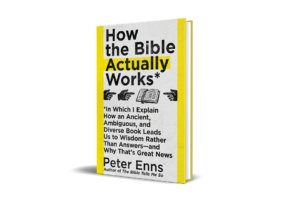From where I stand, the Bible’s true purpose is more than supplying spiritual information to be downloaded. It holds out for us an invitation to join an ancient, well-traveled, and sacred quest to know God, the world we live in, and our place in it. Not abstractly, but intimately and experientially.
A quest—meaning this is going to take some time and effort. No “Have a Great Spiritual Life in Five Easy Steps!” pamphlet. The Bible isn’t just going to hand us the goods.
I’m not suggesting that the Bible doesn’t provide us with any information to enlighten and inspire us or any answers to help mark our path. It does. I only mean that it also provides us with another kind of information, too often brushed aside, that (appreciate the irony) shows us that “providing information” and “giving answers” is not the Bible’s true purpose.
After all, if the Bible’s true purpose were to provide us with simple information about what God is like and what God wants from us, then why can the Bible be so easily used to:
- Justify both slavery and its abolition?
- Justify both keeping women subordinate to men and fully emancipating them?
- Justify violence against one’s enemies and condemn it?
- Justify political power and denounce it?
Both sides of these (and many other) issues have been embraced with uncompromising passion throughout the course of history by real people, convinced they were simply following the Bible’s “clear teaching.” But if polar opposite positions can keep claiming the Bible’s support, then perhaps providing “clear teaching” might not be what scripture is prepared to do. Just throwing that out there.
The Bible, it seems to me, was never intended to work as a step-by-step instructional manual.
Rather, it presents us with an invitation to explore.
Or better, the Bible, simply by being its ancient, ambiguous, and diverse self, blocks us from the simple path of seeking from it clear answers and rather herds us toward a more subtle, interesting, and above all sacred quest.
That quest is summed up in one beautiful, deep, too often neglected, but absolutely central and liberating biblical idea that shapes everything I have to say in this book: wisdom.
Wisdom isn’t some secret key available only to an elite few, but the exact opposite. Wisdom is a gift from God, liberally available to all. It is, as we’ll see, a “part” of God that saturates every square inch of the world around us and at the same time invades even the hidden places of our heart, those things we like to keep from others, in order to mold and form us into mature children of God.
To put it in Christian terms, wisdom is what forms us to be more like Jesus, who, as the apostle Paul put it, became for us wisdom from God (1 Cor. 1:30).
Shepherding us toward wisdom, kicking and screaming if need be: that is the Bible’s purpose.
The Bible becomes a confusing mess when we expect it to fulfill some other purpose—like functioning as an owner’s manual for faith. But when we allow the Bible to determine our expectations, we see that intending to gain wisdom is our proper spiritual posture toward it.
Wisdom isn’t about flipping to a topical index so we can see what we are to do or think—as if the Bible were a teacher’s edition textbook with the answers supplied in the back. Wisdom is about the lifelong process of being formed into mature disciples, who wander well along the unscripted pilgrimage of faith, in tune to the all-surrounding thick presence of the Spirit of God in us and in the creation around us.
Rule-book answers deliver certitude and finality, but wisdom embraces mystery.
Rule-book answers are distant and passive, but wisdom is intimate and learned through experience.
Rule-book answers are immediate, but wisdom takes trial and error over time.
Rule-book answers provide comfort and stability, but wisdom asks us to risk letting go of what is familiar for God’s surprises.
Rule-book answers are designed to end the journey, but wisdom shapes us so we journey with courage and peace.
Rule-book answers are limited to specific moments, but wisdom works in all times and places.
Rule-book answers keep us small, but wisdom gives us the space we need to grow.
Embracing rather than avoiding the Bible’s antiquity, ambiguity, and diversity is like shining a light in a dark room, showing us that the Bible is a book of wisdom rather than prescribed answers, and inviting us to accept the sacred responsibility of pursuing wisdom and thereby learning to live well in God’s creation.
The path of wisdom isn’t a bigger and better “answer,” another version of the same quest for certainty. It’s a shift in attitude, a new posture for a lifelong journey of letting go of the need for such things.
 How the Bible Actually Works is now available. Grab a copy here!
How the Bible Actually Works is now available. Grab a copy here!

